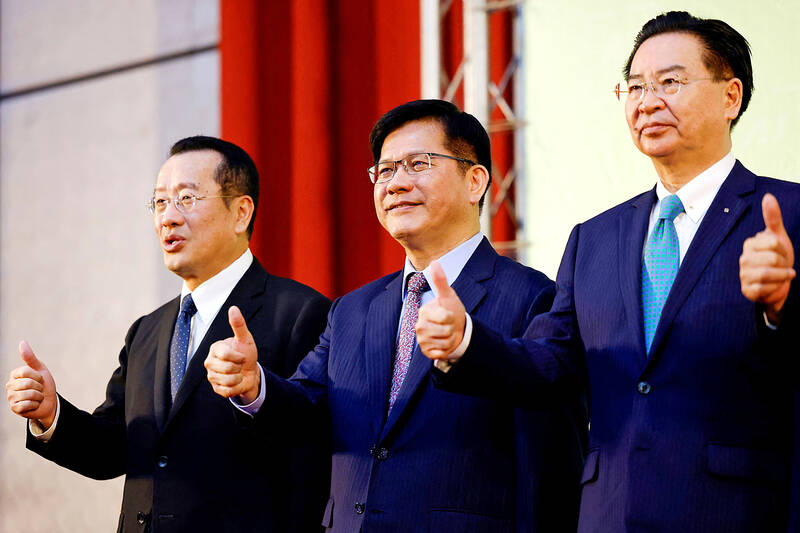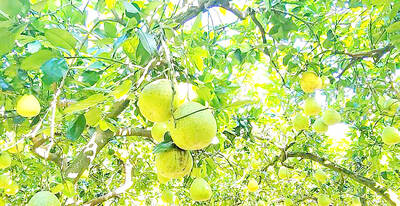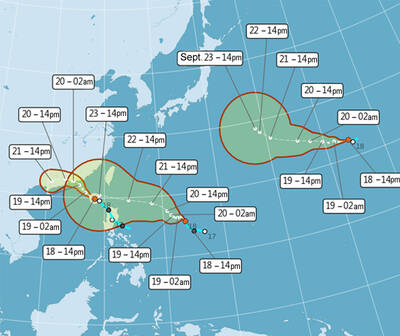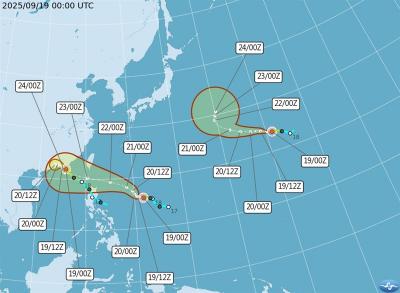The new Cabinet appointments announced yesterday symbolize the continuation of President Tsai Ing-wen’s (蔡英文) national defense and cross-strait policies, experts said.
In cross-strait affairs, the appointment of Chiu Chui-cheng’s (邱垂正) as head of the Mainland Affairs Council (MAC) and of Vice Premier Cheng Wen-tsan (鄭文燦) as head of the Straits Exchange Foundation (SEF) sends a message to Beijing that the new administration wants to adopt a steady and cautious approach, said Tzeng Wei-feng (曾偉?), an assistant researcher at the Institute of International Relations at National Chengchi University.
President-elect William Lai (賴清德) appears to want to extend a gesture of goodwill toward Beijing by appointing national security officials largely from those in Tsai’s administration, Tzeng said.

Photo: Reuters
This suggests there would not be significant changes to cross-strait relations, he added.
Chiu is well-versed in cross-strait relations and has extensive connections in the cross-strait industrial sector and academia due to his tenure at the SEF and teaching experience at National Quemoy University in Kinmen County, Tzeng said.
He had also served as MAC spokesman, in which he had maintained a tough stance on cross-strait issues, especially when speaking about Taiwan’s sovereignty and interests, Tzeng said.
In March 2022, Chiu said at a MAC news conference that the government neither accepts nor recognizes Beijing’s “one China” principle, which claims Taiwan as part of Chinese territory.
He added that to accept the so-called “1992 consensus” is to deny the existence of the Republic of China.
The “1992 consensus” — a term that former MAC chairman Su Chi (蘇起) in 2006 admitted making up in 2000 — refers to a tacit understanding between the Chinese Nationalist Party (KMT) and the Chinese Communist Party (CCP) that both sides of the Taiwan Strait acknowledge that there is “one China,” with each side having its own interpretation of what “China” means.
As for Cheng, he had established a cross-strait affairs group within the Taoyuan City Government during his tenure as mayor to promote exchanges between Taoyuan and cities in China, Tzeng said.
National Taiwan Normal University professor Huang Hsin-hao (黃信豪) said that Lai appointing Chiu and Cheng showed a desire for stability and a willingness to follow Tsai’s approach to cross-strait relations.
However, the specialist in CCP politics added that the appointments would have little impact on the direction of cross-strait relations.
The key lies in Lai’s inaugural speech on May 20, which Beijing would watch closely for clues to his cross-strait policy, Huang added.
Hsu Shu-po (許舒博), head of the General Chamber of Commerce of the Republic of China, said that Chiu and Cheng gained profound understanding of how industries operate during their respective tenures as the deputy head of the MAC and as vice premier.
While the current economic interdependence between Taiwan and China sits at about 30 percent — with Taiwanese businesses operating many factories across the Strait — the duo is well-prepared to handle cross-strait affairs, Hsu said.
As for defense positions, experts praised Lai’s appointment of National Security Council (NSC) Secretary-General Wellington Koo (顧立雄), a civilian, to head the defense ministry.
Koo’s lack of military experience makes him the best choice among all the new Cabinet members, as he would be the perfect liaison between the military and the public, Taiwan Economic Democracy Union Convener Lai Chung-chiang (賴中強) said.
Taiwan needs a defense minister not affiliated with the military to help promote its defense policies, conscript policy reforms and army restructuring plans, he said.
The primary issues facing the incoming administration are how Taiwan would continue to maintain a prosperous economy and bolster national defenses, he added.
Speaking at the announcement yesterday, Koo told reporters that he is familiar with Taiwan’s overall strategic self-defense goals and would do his best to modernize the nation’s troops.
He also pledged to promote training programs that would simulate actual battlefields and would seek to reform the nation’s reserve forces as a reliable backup for the regular troops.
Most importantly, Koo said he would continue to build Taiwan’s combat capability in collaboration with other nations to prevent China from taking military action against Taiwan.
Minister of foreign affairs-designate Lin Chia-lung (林佳龍), the current secretary-general to the president and a former Taichung mayor, told reporters that Taiwan is facing a unique and challenging situation on the global stage.
He vowed to continue to uphold “steadfast and trustworthy diplomacy,” based on shared democratic values, in the interest of the nation’s development and survival.
He pledged to promote economic and trade diplomacy and business cooperation with foreign countries to bolster Taiwan’s diplomacy efforts.
Additional reporting by Chen Yun

NEW AGREEMENT: Malaysia approved imports last year after nearly two years of negotiations and inspections to meet quarantine requirements, officials said Up to 3.6 tonnes of pomeloes from Taiwan cleared Malaysian customs on Friday, in the first shipment of Taiwanese pomeloes to Malaysia. Taiwan-grown pomeloes are popular in domestic and overseas markets for their tender and juicy taste, the Ministry of Agriculture’s Animal and Plant Health Inspection Agency said. The fruit is already exported to Japan, Canada, Hong Kong, Singapore and the Philippines, it added. The agency began applying for access to the Malaysian market in 2023, compiling data on climate suitability, pests and diseases, and post-harvest handling, while also engaging in nearly two years of negotiations with Malaysian authorities and submitting supplementary

PEAK MONTHS: Data showed that on average 25 to 27 typhoons formed in the Pacific and South China seas annually, with about four forming per month in July and October One of three tropical depressions in the Pacific strengthened into a typhoon yesterday afternoon, while two others are expected to become typhoons by today, Central Weather Administration (CWA) forecaster Lee Ming-hsiang (李名翔) said yesterday. The outer circulation of Tropical Depression No. 20, now Typhoon Mitag, has brought light rain to Hualien, Taitung and areas in the south, Lee said, adding that as of 2pm yesterday, Mitag was moving west-northwest at 16kph, but is not expected to directly affect Taiwan. It was possible that Tropical Depression No. 21 would become a typhoon as soon as last night, he said. It was moving in a

Tigerair Taiwan and China Airlines (CAL) today announced that several international flights were canceled or rescheduled due to Typhoon Ragasa. The Central Weather Administration (CWA) has maintained sea and land warnings for the typhoon. Its storm circle reached the Hengchun Peninsula (恆春半島) on Taiwan's southern tip at 11am today. Tigerair Taiwan said it canceled Monday's IT551/IT552 Taoyuan-Da Nang, IT606/IT607 Taoyuan-Busan and IT602 Taoyuan-Seoul Incheon flights. Tomorrow, cancelations include IT603 Seoul Incheon-Taoyuan, as well as flights between Taoyuan and Sapporo, Osaka, Tokyo Narita, Okinawa, Fukuoka, Saga, Tokyo Haneda, Nagoya, Asahikawa and Jeju. On Wednesday, the IT321/IT322 Kaohsiung-Macau round-trip would also be canceled. CAL announced that today's

Three tropical depressions yesterday intensified into tropical storms, with one likely to affect Taiwan as a typhoon, the Central Weather Administration (CWA) said. The three storms, named Mitag, Ragasa and Neoguri, were designated as storms No. 17 to 19 for this year, the CWA said. Projected routes indicate that Ragasa is most likely to affect Taiwan, it said. As of 2am today, Ragasa was 1,370km east-southeast of Oluanpi (鵝鑾鼻) on the southernmost tip of Taiwan. It was moving west-northwest before turning northwest, slowing from 11kph to 6kph, the agency said. A sea warning for Ragasa is unlikely before Sunday afternoon, but its outer rim